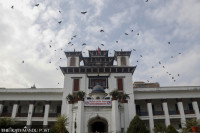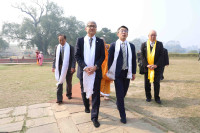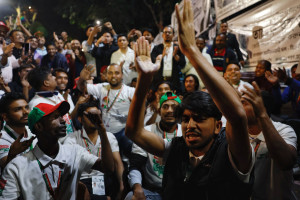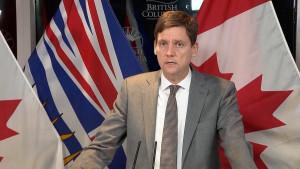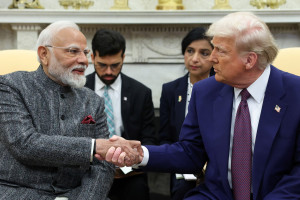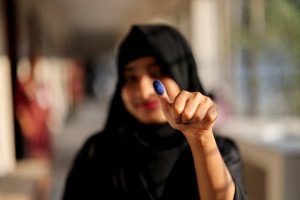World
Leaders and experts urge Nepal to push for bigger space in relations with India
BJP leader Jolly calls Saarc defunct, says ‘terror and trade’ can’t go together. Concerns raised over India’s river-linking project.
Post Report
Political party leaders, lawmakers and experts have said that time has come for Nepal to create a new space in New Delhi, especially as India’s relations with some of its neighbours including Bangladesh, Maldives and Sri Lanka are facing difficulties.
“We are so tempted,” said former minister and Nepali Congress leader, Minendra Rijal, “that we should create a space in New Delhi out of the partnership that we have had till now and particularly after the Pahalgam incident.”
Speaking at an event in Kathmandu on Monday organised by the Institute for Public Policy and Partnership, Rijal stated that since India’s ties with other neighbours like Bangladesh, Maldives and Sri Lanka is facing some difficulties, Nepal has to seize the opportunity though we understand that New Delhi has hardly any time to think over its ties with Nepal.”
“No one can substitute Nepal-India relations. Since India is a big country, we definitely have complaints about it. Our relation goes beyond the Roti-Beti cliché [sociocultural ties] and these relations don’t fit in any single framework. But when engaging with India, most of the time, our leaders only cared about their politics and how to secure their election tickets,” he said, while calling for sincere and open dialogue with New Delhi on sensitive issues.
Speaking at the same function, former foreign minister NP Saud said that in diplomacy, it is impossible to make relations completely balanced as some people suggest.
“We have to maintain our relations by keeping national interest at the core. We should be open while dealing with India. Non-alignment has become increasingly irrelevant and multilateralism is becoming important to us. In this context, we need to fine-tune our relations with India due to the emerging global and regional context,” said Saud.
Vijaya Jolly, former in-charge of the Bharatiya Janata Party’s foreign cell, recounted the long-standing neighbourly relations between Nepal and India and sought more support from Nepal for India’s fight against terrorism.
“It was India which responded first when an earthquake struck Nepal in 2015. Prime Minister Modi visited Nepal for a record five times since 2014, but at the same time, nine Nepali prime ministers went on official visits to India. Over 7.5 million Nepali nationals are living and working in India, which makes our relations special and unique. The security forces of both countries are guarding their respective borders,” said Jolly, adding that India does not mind if Nepal conducts its independent foreign policy with any country.
Condemning the recent terrorist attack in Pahalgam of Indian-administered Jammu and Kashmir, Jolly stated that there is no space for terrorism in South Asia. “ Saarc is dead, and terror and trade cannot go together. After 2025, we have to give new dimensions to our bilateral ties,” he said.
Sishir Khanal, head of the international department of the Rastriya Swatantra Party, said that although Nepal-India ties are natural, there is a kind of dilemma and worry in Kathmandu about whether New Delhi will accept Nepal’s territorial integrity, given the context of the boundary dispute.
“There is a kind of inferiority complex in us. We are riding on an over-projection of nationalism. Through foreign policy tools and apparatus, India should respect Nepal’s concerns. And we have to convince them that we are committed to their national security interest, and both sides are committed to respecting each other’s national security concerns. It looks like we are unable to pursue our concerns with the Indian side with due sincerity,” said Khanal, who is also a lawmaker of the party.
Another RSP lawmaker, Santosh Pariyar, said that Nepal could not give the shape to the kind of bilateral relations it wanted to establish.
“It looks like both Nepal and India have failed to understand the interdependency in their relations, ranging from market, politics, culture, history, and others. No nation-state theory works in our bilateral ties. We have to find the reasons why political relations are not up to the mark, and why the kind of relationship we should have with India, has not materialised,” said Pariyar.
Mukesh Kafle, former managing director of the Nepal Electricity Authority, raised concerns over India’s ambitious river-linking project, which plans to route water from Nepal’s Koshi and Mechi rivers. He said the government should take up the matter with India on its possible impact.
Former Nepal Army general Binoj Basnyat, energy expert Prabal Adhikari, foreign policy experts like Arun Subedi, Yagya Neupane among others also had expressed their views of various aspects of Nepal-India relations.




 20.12°C Kathmandu
20.12°C Kathmandu